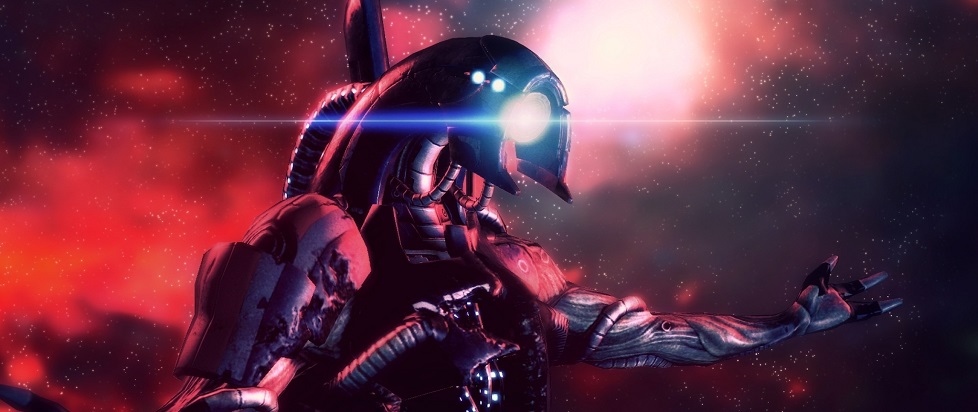
What Was the Question? And Why Do You Ask?
 This column is reprinted from Unwinnable Monthly #110. If you like what you see, grab the magazine for less than ten dollars, or subscribe and get all future magazines for half price.
This column is reprinted from Unwinnable Monthly #110. If you like what you see, grab the magazine for less than ten dollars, or subscribe and get all future magazines for half price.
———
Revisiting stories, old and new
———
If the treatment of religion in Mass Effect: Andromeda is so disappointing, it is in part because the imagination and performance of the religious self — the spiritual self, or at least the numinous self — in other BioWare games is so much more engaged and interesting. In Andromeda, when Suvi Anwar, the Tempest’s science officer, expresses her faith, and her lack of internal conflict between that faith and her work as a scientist, the player is given the choice only to affirm that expression or ridicule it. This is markedly different than, say, Thane Krios’s discussion of his somewhat unusual (even for his species) polytheism, to which Shepard’s interest, or lack thereof, is never construed in terms of any apparent need to express agreement or disagreement with Thane’s beliefs.
This treatment of Suvi’s spirituality is irreconcilable with the question, left unanswered during the entirety of Mass Effect 2, as to whether a geth unit possesses a soul. In part because the question of whether the geth have a souls is not really about whether the geth have souls.
When Mass Effect 2 and 3 ask whether the geth have souls, there are at least three levels on which the question operates, the least interesting of which is the theological. When the geth start to ask whether they have souls, the quarians are concerned because if the geth become capable of self-regard, they become more difficult to control. A being capable of considering its own existence and interests is likely to come to the conclusion that its exploitation does not line up with either its immediate best interests or its continued existence. This is why places where people have enslaved other people create myths about the enslaved being less developed and less intelligent. This is why these places, including the United States, passed laws forbidding literacy among the enslaved.

If the first level we’ve touched on is the theological level (do the geth actually have souls?), and the second is the practical level (can the geth be controlled?), the third level is the most interesting and frustrating at once — the moral/ethical level. While perhaps not of the greatest concern to the quarians as a whole, this is the consideration that touches Tali’Zorah vas Neema most closely — and it finds the most direct (and maddening) echo in the small handful of episodes of Star Trek: The Next Generation where Data has to argue and re-argue his citizenship in the federation. (In the second season episode “The Measure of a Man,” after an extended argument over whether Data is sentient, the presiding advocate is unable to render a verdict without asking aloud whether Data has a soul.)
The question of the possession of a soul in this context concerns status as a moral agent to which one is obligated to admit the dignity of moral and ethical consideration. In a legal sense, this is what we argue about when we argue whether animals do or do not have rights, and the denial of this dignity is the injury we inflict (among others) when we behave as if another is not worthy of moral consideration. This, if we are not purely utilitarian, is why it is wrong to do another harm, even if that harm is minor, or if the recipient of that harm is unaware of it. (This moral agency and subjectivity is at the center of probably the most substantive non-religious moral formulation, Kant’s categorical imperative, which is itself not entirely dissimilar to the golden rule, but that’s another essay.)
 The centering of this question of moral agency and subjectivity on the possession of a soul, on the other hand, is why (at least when the argument is made in good faith) atheism is considered as lending itself to (or even as stemming from) moral degeneracy. If a soul is necessary for moral agency, then the denial of the soul is the denial of the possibility of moral agency. Then we are all, in the end, nothing more than beasts. (This is also why the question of whether artificial beings possess souls is so much more frustrating in Star Trek than Mass Effect. Tali is an explicitly religious character, and a member of a society in whose structure spirituality is an explicit and everyday concern. The Federation is frequently presented as having “moved beyond” such questions. There are fine episodes in which Worf wrestles with his spirituality as a Klingon, but religion is almost always presented as either an artifact or alien — that is, non-human.)
The centering of this question of moral agency and subjectivity on the possession of a soul, on the other hand, is why (at least when the argument is made in good faith) atheism is considered as lending itself to (or even as stemming from) moral degeneracy. If a soul is necessary for moral agency, then the denial of the soul is the denial of the possibility of moral agency. Then we are all, in the end, nothing more than beasts. (This is also why the question of whether artificial beings possess souls is so much more frustrating in Star Trek than Mass Effect. Tali is an explicitly religious character, and a member of a society in whose structure spirituality is an explicit and everyday concern. The Federation is frequently presented as having “moved beyond” such questions. There are fine episodes in which Worf wrestles with his spirituality as a Klingon, but religion is almost always presented as either an artifact or alien — that is, non-human.)
But, as Legion and Tali both know, spirituality is not the same as virtue. The quarians and the geth are both capable of moral error and inflicting harm. There is no shortage of evidence that we are capable of violence even when the subject of that violence is believed beyond question to have a soul.
So if each of these three levels of the question — the theological, the practical, and the moral/ethical — are ultimately unsatisfactory, why do we keep asking it? For what do we reach? If the soul neither ensures that we will act as moral creatures, nor that others will treat us as such, why does its absence still feel like a loss? Why, given the history between the geth and organics, should Legion want a soul? Why is it not just plausible but compelling that he should be driven by the question anyway?
Even now, when I face the question, I can’t quite bring myself to affirm the possibility, but neither am I inclined to ridicule it. Like Legion and Shepard on the Normandy, I suspect there’s at least as much to be gained from remembering who asked the question, in what circumstances, and asking ourselves again and again than in settling on an answer.
———
Gavin Craig is a writer and critic who lives outside of Washington, D.C.




